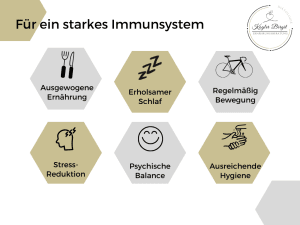An article by Birgit Kogler BSc, dietician:
https://www.ernaehrungsberatung-kogler.at/
Fit for the cold season – nutrition tips for a strong immune system
A sniffly nose here, a scratchy throat there: The cold season is already knocking on the door and with it, colds, flu and the like are back on the programme. NOW is therefore the perfect time to strengthen your immune system and fight coughs, sore throats and other cold symptoms. You can find out how to do this here:
A strong immune system: how it works
The human immune system is a highly complex system. It protects us from harmful viruses and bacteria and also kills the body’s own malignant cells to prevent the development of cancer. To support the immune system in this important work, you should consider the following factors:
Nutrition and the immune system
An important building block for a strong immune system is a balanced diet. Our immune system is busy every day fending off intruders and thus protecting our body from diseases. And we should support the immune system in this top performance – with the following nutrients:
| Protein | Omega 3 fats | Fibers |
| vitamins: A, D, E, C |
minerals: iron, zinc, magnesium, selen |
secondary plant substances |
In order to obtain these nutrients in sufficient quantities, it is particularly important to eat as colourful, fresh and varied a diet as possible. It is always better for our bodies to obtain the above-mentioned nutrients from natural foods than to take high doses of individual vitamins in pill form. After all, these pills are also called dietary supplements – and not food supplements.
It is best to observe the following dietary recommendations:
- Eat fresh, preferably unprocessed food every day
- Drink enough water
- Eat 3 portions of vegetables and 2 portions of fruit every day – regional and seasonal if possible
- Use wholemeal products instead of (highly processed) white flour products
- Use high-quality vegetable oils for cooking and salads
- Eat nuts and seeds daily
- Favour high-quality protein sources such as fermented natural dairy products, eggs, pulses and occasionally lean meat and fish
Influence of individual micronutrients
Some vitamins and minerals are considered to be particularly immune-boosting: vitamin D, C, zinc.
Vitamin D:
- For the maturation of immune cells
- Contained in small amounts in fish, cheese, mushrooms, fortified margarine and eggs
- However, it is not possible to obtain sufficient amounts from food
- From March to October, the body’s own production via the skin with the help of sunlight is crucial
Problem child vitamin D
When the temperatures drop and the clothes get thicker again, that’s it for the body’s own vitamin D production. Why is that? Quite simply – the sun is missing! From October to March, the power of the sun is not sufficient to produce enough vitamin D. This is one of the reasons why the incidence of colds and other illnesses increases in winter. Therefore, have your vitamin D status determined in the winter months with the help of a blood test so that you can recognise a possible deficiency and take countermeasures. Ask your doctor whether and how much vitamin D you should take in the form of supplements. You can then react in good time for the coming years and prevent a deficiency with vitamin D drops (e.g. from Alpenpower). Good to know: Take the vitamin D supplement with a meal containing fat – this can improve the absorption of the fat-soluble vitamin.
Caution: An overdose of vitamin D is also possible and can result in calcium deposits in blood vessels and organs (hypercalcaemia syndrome). Therefore, always take only the recommended amount and consult your doctor or a dietician if you have any questions.
Vitamin C and zinc:
- Protects immune cells from free radicals (=antioxidant)
- Vitamin C in: Peppers, berries, broccoli, potatoes, cabbage, cabbage
- Zinc in: Oatmeal, lentils, nuts, cheese
If you frequently suffer from colds or your immune system is particularly challenged due to chronic illnesses or competitive sport, it may make sense to increase your vitamin C and zinc intake. Supplements (e.g. Immune Plus Complex from Alpenpower) can help you here. However, always pay attention to the ingredients of supplements to avoid overdosing.
Other important micronutrients for our immune system are Selenium, iron, magnesium, vitamins A and E. These can be obtained from wholemeal cereals, nuts, vegetable oils and meat.
Are dietary supplements useful?
In certain situations, such as pregnancy and breastfeeding, chronic illnesses, older people or competitive sports, the need for immune-boosting nutrients can increase, so it can make sense to supplement your diet with supplements.
Note the following about supplements:
- Supplements are NOT a substitute for a balanced diet and should not be taken to compensate for poor eating habits.
- Always check the ingredients.
- It is best to seek advice from qualified persons (pharmacists, doctors, dieticians).
- In order to prevent an oversupply – especially possible with vitamin D – several supplements should not be taken indiscriminately at the same time.
Conclusion
To start the cold season in good shape, you should eat as colourful, varied and balanced a diet as possible. With plenty of fresh fruit and vegetables, regular wholemeal cereal products, daily vegetable oils and nuts as well as sufficient protein from plant and animal sources, you can provide your immune system with all the important nutrients it needs.
Author: Birgit Kogler BSc, dietician: https://www.ernaehrungsberatung-kogler.at/
Sources:
Baumann A, Hagenlocher Y, Lorentz A: Ernährung und Immunologie. In: Ernährungs Umschau 12/2013; M706-M716.
Bilotta S, Schrainer J, Weinhart L, Lorentz A: Ernährung und Immunsystem. Einflüsse von Über- und Unterernährung, vegetarischer und veganer Ernährung. Ernährungs Umschau 2021; 68(5): M278–87. DOI: 10.4455/eu.2021.020
EFSA Panel on Dietetic Products, Nutrition and Allergies (NDA) (2012) Scientific opinion on the tolerable upper intake level of vitamin D1. EFSA Journal 10: 2813
Heseker H, Stahl A, Strohm D: Vitamin D. Physiologie, Funktionen, Vorkommen, Referenzwerte und Versorgung in Deutschland. In: Ernährungs Umschau 4/2012. 232-239.
Mahmoudi M, Rezaei N: Nutrition and Immunity. 2019. Springer.






